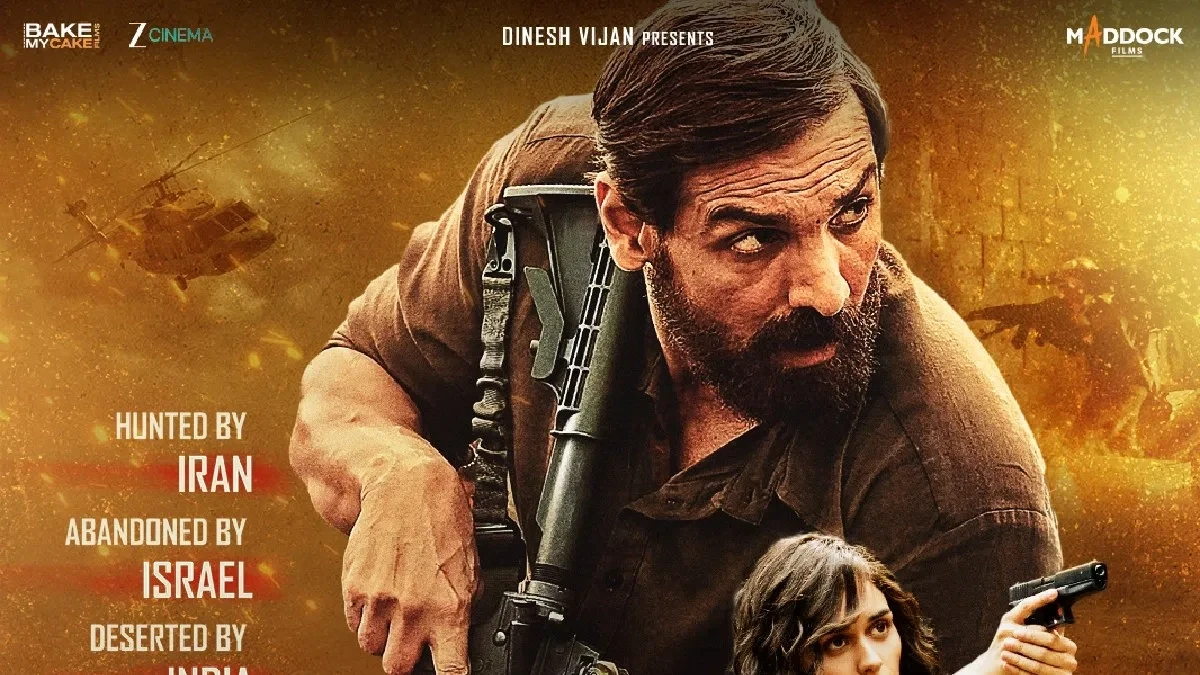John Abraham starrer Tehran has finally released and it is undoubtedly a perfect Independence Day release. Right from the first frame, Tehran assures that this isn’t your usual action-packed spy flick and it lives upto the expectation.
It’s brooding, politically charged, and emotionally raw. For the uninitiated, Tehran is inspired by the 2012 attack on Israeli diplomats in India and it wastes no time in throwing you into the murky waters of real-world geopolitics. With stakes that span continents and a personal tragedy anchoring the story, Tehran emerges as one of the most layered and mature performances of John Abraham’s career.
To note, John Abraham plays the role of DCP Rajeev Kumar, a Special Cell officer who is pulled into a high-stakes investigation after a bombing shakes the national capital. The blast kills a flower-selling girl – someone Rajeev personally knew – making the mission not just a professional one, but deeply personal. It’s in this complexity that John delivers one of his most restrained and compelling portrayals to date. John’s character Rajeev is not a man of loud proclamations but of burning intensity, worn down by grief, duty, and the crushing ambiguity of truth. It’s a refreshing turn for an actor often seen in hypermasculine roles, and here, he leans into silence and subtlety.
Director Arun Gopalan smartly chooses not to lean on action cliches. Instead, the screenplay by Ritesh Shah, Ashish P. Verma, and Bindni Karia embraces nuance. The film carefully portrays India’s precarious position in global politics – caught between alliances, retaliation, and diplomacy. Each confrontation is taut, and each dialogue-heavy scene is packed with quiet urgency. The pacing may not be breakneck, but Tehran certainly maintains a steady grip on your attention.
On the other hand, Manushi Chhillar as SI Divya Rana leaves a mark despite her limited screen time. She plays a key role in a pivotal plot twist that propels the story into its high-stakes second half. Meanwhile, Neeru Bajwa stands tall as diplomat Sheilaja – elegant, assertive, and composed under pressure. She adds much-needed depth to the bureaucratic world the film explores, proving that power and grace can co-exist on screen.
Hadi Khajanpour’s Asraf Khan, the suspected terrorist, is quietly terrifying. He avoids melodrama, choosing instead to play the villain with icy conviction. It’s not just Asraf who’s unsettling – the ensemble cast around him, even in minor roles, are treated with weight and backstory. Every character feels deliberate, and that gives the film a lived-in authenticity.
One of the strongest aspects of Tehran lies in its visuals. Cinematographers Ievgen Gubrebko and Andre Menezes give us a rich, textured canvas – from the bustling streets of Delhi to the stark, tension-filled corridors in Abu Dhabi. The colour palette is used smartly: warm tones in Rajeev’s personal scenes, cold desaturation during international standoffs. Ketan Sodha’s background score hums with restraint, building pressure without being overbearing. Editor Akshara Prabhakar ensures the film never loses its rhythm, cutting smoothly between action and emotion.
A notable gear-shift comes mid-way when Rajeev, disillusioned by political delays, goes rogue. What begins as a sanctioned mission quickly becomes personal and unsanctioned. This transformation infuses the second half with raw tension. Suddenly, Rajeev is on his own, and every decision feels like a gamble. It’s here that Tehran morphs into a tightrope walk between justice and vengeance.
Where Tehran really earns its stripes is in refusing to offer clean answers. It doesn’t force redemption arcs or grand heroic finishes. It accepts the messiness of the world it inhabits – one where the “right” decision depends on where you’re standing. It’s a film about people trying to do good in systems that often reward ambiguity. The ending, like the rest of the movie, is grounded and honest.
In the crowded landscape of thrillers, Tehran, which is produced by Maddock Films and Bake My Cake Films, carves a space for itself by being bold, emotionally intelligent, and politically aware. While it might not cater to fans of mindless spectacle, it speaks directly to those who crave tension, depth, and realism. John Abraham has never felt more human – or more relevant. And that alone makes Tehran worth watching.
